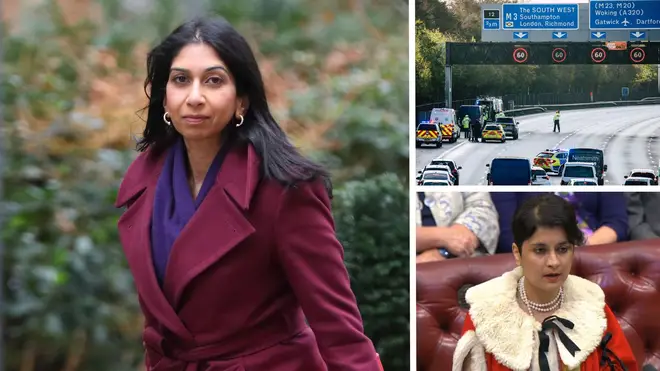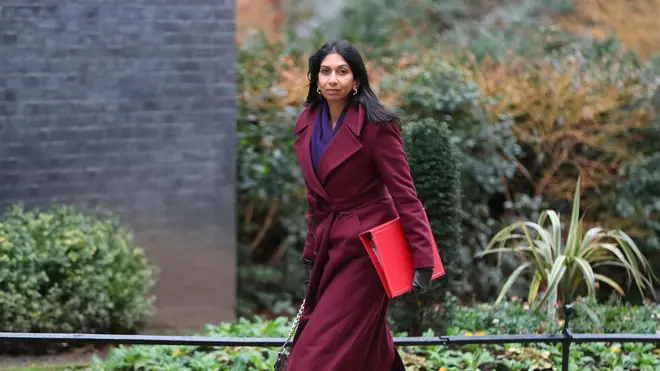
Matthew Wright 7am - 10am
7 February 2023, 05:58 | Updated: 7 February 2023, 08:54

Suella Braverman has ordered Conservative peers to vote against a new law seeking to bolster the rights of journalists covering protests following the arrest of LBC's Charlotte Lynch in November 2022.
Despite being in possession of her press card and an LBC branded microphone, Charlotte was approached by two officers responding to a Just Stop Oil protest on the M25, who arrested her on suspicion of conspiracy to commit public nuisance.
Handcuffed and with all of her equipment seized, she was taken to Stevenage police station in the back of a Hertfordshire Constabulary van; there, with tears running down her face, she was ushered into a police cell, where she remained for the next five hours.
Recalling the incident on LBC the next day, Charlotte admitted she was "absolutely terrified" throughout the ordeal.
While Hertfordshire Police eventually conceded that she had been wrongfully arrested, her case sparked significant concerns surrounding press freedom, with the prime minister's spokesperson stressing "it is vital journalists are able to do their job freely without restriction".
To this end, a coalition of opposition and crossbench peers tabled an amendment to the government's controversial Public Order Bill, led by Labour peer and former Shadow Attorney General, Baroness Chakrabarti.

LBC Reporter recounts her arrest for doing her job at an eco-protest
Dubbed "Charlotte's Law", Clause 18 was drafted to "protect journalists, legal observers, academics, and bystanders who observe or report on protests or the police's use of powers related to protests".
Yet, as peers prepare to vote on the measure this evening, sources have revealed to LBC that the home secretary is marshalling Conservatives in the upper chamber to reject the amendment's introduction, meaning it is expected to be the latest in a series of heavily contested disputes over the Public Order Bill.
Labour's Lord Falconer said: "Charlotte's experience… she was not alone, there were two other journalists on the day, there have been other journalists who have been arrested in the last year.
"It is absolutely obvious that even if the law protects journalists at the moment the police just ignore that.
"What's more, after Charlotte was arrested, the PCC, the police and crime commissioner for Hertfordshire, justified the arrest by saying well the journalists being there incite the protesters by filming them.
"It's an sbolutely outrage. The minister's answer, namely don't you worry, things are ok, the law's fine, is absolutely nonsense."
He feared without the amendment passing, police will be uninhibited from detaining journalists.
Just last week, the government sustained two narrow defeats on the bill in the House of Lords, with an amendment attempting to prevent protests on an issue of "current debate" being struck down by a mere three votes (221 vs 224).
With the amendment's passing in doubt, Baroness Chakrabarti told LBC that she laments Ms Braverman's decision to oppose "Charlotte's Law".

"Free and open reporting matters. It matters whatever people's views on protests that they support or detest," she said.
"For the home secretary to double down and reject cross-party attempts to protect those who report on demonstrations, is a dark day for democracy and a new low for this totally dysfunctional excuse for a Government.
"I urge all peers to vote for this new provision in honour of LBC's Charlotte Lynch and all journalists wrongfully arrested, detained and bullied just for doing their vital work."
Asked whether Ms Braverman would be supporting Baroness Chakrabarti's proposals, a home office spokesperson said: "The Public Order Bill will give the police the powers they need to prevent and respond to guerrilla tactics that cause misery to the hard-working public.
"Freedom of the press is a cornerstone of our democracy and there are already safeguards under current legislation, which can ensure that journalists are protected when reporting on protests."